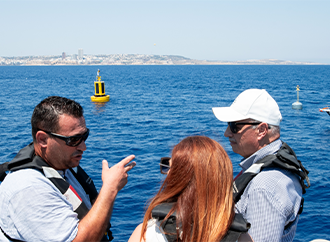
Understanding Malta’s Marine Environment Through Advanced Oceanography
The Mediterranean island of Malta is at the forefront of oceanographic research, thanks to the dedicated efforts of the Oceanography Malta Research Group (OMRG) at the University of Malta. As climate change accelerates and marine ecosystems face increasing threats, comprehensive and continuous ocean monitoring becomes vital for safeguarding the country’s marine resources and developing effective policies.
Malta’s geographic position in the middle of the Mediterranean Sea makes it uniquely vulnerable to environmental shifts. The oceanography research conducted here not only helps local environmental management but also contributes to the global understanding of climate impacts on marine systems. By deploying cutting-edge technology and fostering academic excellence, the University of Malta plays a crucial role in observing, analyzing, and responding to oceanic changes.
Why Ocean Monitoring Matters for Malta and Beyond
The ocean is a dynamic and complex system that reacts to natural and human influences. Changes such as rising sea surface temperatures, ocean acidification, declining oxygen levels, and altered current patterns are signs of broader climate alterations. Monitoring these parameters offers critical insights into how our seas are evolving, especially in an island nation like Malta, where marine health directly influences the economy, biodiversity, and societal well-being.
The data collected by the Oceanography Malta Research Group informs several national strategies, including climate adaptation, marine spatial planning, pollution control, and disaster preparedness. Understanding these data points helps Malta develop resilient infrastructure, protect coastal communities, and sustain vital industries such as fisheries and tourism.
Advanced Technologies Drive Oceanographic Research
OMRG employs a variety of sophisticated instruments to measure environmental variables such as sea temperature, salinity, dissolved oxygen, pH levels, phytoplankton concentrations, and current velocities. These instruments gather real-time data, which is then integrated into modeling systems to analyze trends over time. This approach enables researchers to detect early signs of ecological disruptions and predict potential future scenarios.
By combining field measurements with remote sensing and computer modeling, the group creates comprehensive datasets that support both scientific discovery and practical policy development. These efforts are essential for adapting to climate change impacts, ensuring sustainable use of marine resources, and maintaining Mediterranean biodiversity.
The Role of Education and Citizen Science in Marine Monitoring
Beyond research, the University of Malta’s Oceanography Group actively involves students through its MSc in Applied Oceanography program. Students gain hands-on experience deploying instruments, collecting offshore data, and understanding modeling techniques. This educational approach prepares the next generation of marine scientists equipped to tackle evolving environmental challenges.
Public engagement initiatives such as citizen science campaigns also play a significant role. Programs like Spot the Jellyfish or Spot the Alien Fish encourage communities to participate in marine monitoring. These activities raise awareness about invasive species, ecological shifts, and the importance of ocean conservation. Engaging the public fosters a collective responsibility towards safeguarding Malta’s marine environment.
Addressing Climate Change with Scientific Insights
The ongoing research at UM’s Oceanography Malta Research Group provides vital evidence of climate change effects specific to the Mediterranean. Rising sea temperatures impact marine biodiversity and fish stocks, while acidification threatens coral reefs and shell-forming organisms. Data on current patterns aid in understanding how weather extremes and sea-level rise influence coastal infrastructure and communities.
With climate variability increasing, Malta’s policy responses depend heavily on scientific data. The continued monitoring from the university informs adaptive strategies, ensuring that the nation remains resilient against environmental hazards such as intense storms, flooding, and heatwaves.
Join the Effort to Protect Our Oceans
The University of Malta’s commitment to marine research and education underscores the importance of collaborative efforts in addressing environmental challenges. Those interested in supporting or participating in ocean monitoring initiatives can explore postgraduate studies, attend relevant seminars, or engage with public outreach programs.
To learn more about cutting-edge oceanography research and how Malta is contributing to global climate solutions, follow the Oceanography Malta Research Group’s updates on Facebook.
As the world’s oceans continue to face unprecedented changes, the need for continuous, high-quality data becomes more urgent. Malta’s proactive approach, driven by academia and science, exemplifies how targeted research can support sustainable development and environmental resilience in a changing planet.
Take Action and Stay Informed
If you are passionate about marine conservation or interested in advancing oceanographic studies, consider exploring postgraduate programs at the University of Malta or participating in citizen science initiatives. Every effort contributes to a better understanding of our oceans and the development of solutions to preserve their health for future generations.
For further information about oceanographic research at the University of Malta or how to get involved, visit the Oceanography Malta Research Group page.
In conclusion, the University of Malta’s commitment to continuous ocean monitoring and climate research not only enhances local resilience but also offers valuable insights into global marine challenges. Staying informed and engaged allows communities, policymakers, and scientists to work together in protecting one of the planet’s most vital systems—the ocean.

